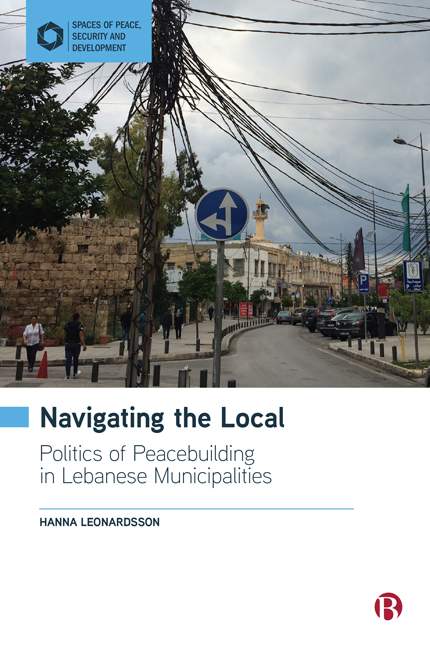Book contents
- Frontmatter
- Contents
- Acknowledgements
- Introduction
- 1 Theorizing Local Peacebuilding
- 2 Lebanese Municipalities, Centralized Peacebuilding and Possibilities for Change
- 3 Service Delivery: Providing for Local Needs
- 4 Local Interactions: Formal and Informal Everyday Interactions
- 5 Vertical Relationships: Connecting the Local to the National and Global
- Conclusion
- References
- Index
Introduction
Published online by Cambridge University Press: 17 January 2024
- Frontmatter
- Contents
- Acknowledgements
- Introduction
- 1 Theorizing Local Peacebuilding
- 2 Lebanese Municipalities, Centralized Peacebuilding and Possibilities for Change
- 3 Service Delivery: Providing for Local Needs
- 4 Local Interactions: Formal and Informal Everyday Interactions
- 5 Vertical Relationships: Connecting the Local to the National and Global
- Conclusion
- References
- Index
Summary
In post-war contexts, building peace is an obvious, yet troubled task. In contemporary and practical terms, peace is viewed as meaning a world ruled by principle and law, often under the banner of liberal peace, emphasizing democratic values, human rights and market liberalization (Richards, 2005, pp 1– 4). However, despite large peacebuilding efforts, the record of peacebuilding is mixed and almost half of all post-conflict countries relapse into conflict within five years (Collier, 2003, p 83; Paris, 2010; Rigual, 2018). Where peace agreements endure, the peace built is frequently centrally controlled, builds on (wartime) elites, reinforces gender roles, lacks local ownership and local legitimacy (Hughes, 2013; Paris and Sisk, 2007, p 3; Rigual, 2018). Lebanon is no stranger to these terms.
While the Lebanese civil war ended in 1989, its post-war developments have included the opening up of political space, economic success and the growth of a Lebanese middle class, a phoenix of coexistence, resilience and joy of life, as well as political stagnation, political assassinations, interand intra-state hostilities, fatal political ignorance, massive public protests and economic crisis, to name a few (Harb and Fawaz, 2020; Khalaf, 2012; Majed, 2020; Zahar, 2009). These developments are embedded in Lebanon's political system, which is characterized by sectarian divides. In addition, its geopolitical position triggers internally and externally run developments, conveying both liberal and illiberal agendas. With internal divides and external presures, Lebanon has been described as being in a situation of no war and no peace (Bou Akar, 2018; Burgis-Kasthala and Saouli, 2022; Ghosn and Khoury, 2011; Mac Ginty, 2010b). Despite good intentions, increasing attention and resources directed towards peacebuilding, post-war countries, such as Lebanon, highlight how the peacebuilding agenda has failed to promote a sustainable peace (Mitchell, 2010, p 2; Schneckener, 2016). With the increasing critique against the liberal peacebuilding agenda, a ‘local turn in peacebuilding’ has emerged (Leonardsson and Rudd, 2015; Mac Ginty and Richmond, 2013). This book is situated at the centre of the local turn debate, empirically exploring local peacebuilding in Lebanon.
The local turn in peacebuilding has its roots in discussions that emerged in the 1990s on the importance of ‘the local’ for building ‘home-grown’ peace (Curle, 1994; Lederach, 1997; Nordstrom, 1997; Paffenholz, 2015b).
- Type
- Chapter
- Information
- Navigating the LocalPolitics of Peacebuilding in Lebanese Municipalities, pp. 1 - 14Publisher: Bristol University PressPrint publication year: 2023



